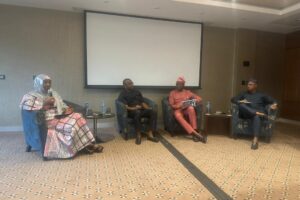
Prince John never imagined a casual game he built from his room in Lagos, Nigeria, would change the arc of his career. Maze Runner, the game he built while freelancing, found its way onto Hyper, an eSports platform paying developers millions of naira to licence their games. The deal paid him enough to seriously consider a future in gaming.
Soon after, Hyper hired him as a contractor to build games for the platform and later as a full-time developer tasked with helping design the startup’s software development kit (SDK). Today, he works with an Israeli game studio that is still building but now has an international reach.
“I can’t reveal the exact figure [Hyper paid for Maze Runner] because of a confidentiality clause,” he said. “But indie developers who licence their games to Hyper earn as much as ₦2.5 million upfront.”
For years, Nigerian developers built games that struggled to travel. On the mobile app stores, they competed against global game studio giants with bigger budgets, and ads were the only path to monetisation.
“The problem with gaming is never content—there’s a lot of content to build a casual game—but monetisation is a headache,” said Yemi Johnson, co-founder of Hyper. “For example, if developers spend $0.5 to acquire a gamer [or user], then they need to show you >$0.5 worth of ads. At a [cost per mille] of $10 per thousand views, it means they need to show you 50 ads just to break even.”
Casual games get boring because they lack a storytelling arc. Take popular titles such as Candy Crush or Subway Surfers: the games never end, you just repeat the same actions through endless levels. Most people play these games to pass time. But once the ads begin to roll in, they quickly become unbearable, causing users to churn.
This is why Hyper exists. Described by Johnson as an “App Store for hyper casual games,” Hyper balances the scale. It pays game developers upfront to publish their game titles on its platform, and sets the stage for users to compete in those games and earn money. Hyper created an economy that rewards game development skill.
Get the best African tech newsletters in your inbox
A new model for casual gaming
Born out of e-tournament platform Metaverse Magna (MVM)—itself a spin-out of Nestcoin, a Nigerian venture studio—Hyper built a central, open-access gameplay where casual games live longer. Previously, Hyper paid developers upfront for rights to publish their games. However, the startup is now adjusting to a commission basis.
Gamers on Hyper pay to compete in skill-based contests that cost between $0.30 and $1, with Hyper taking a 15% commission from those gaming sessions. The fee is then split with developers, who receive 30–50% of the share, depending on how popular their games become. This helps developers save costs on publishing on mobile app stores, where they pay a developer fee and ongoing service fees. With over 100,000 gamers, Hyper is giving developers exposure to players they would never have reached on their own.
The wagers seem tiny, but scale transforms them. Hyper currently runs about 50,000 contests every day. On average, each gamer enters 40 contests a month.
“It’s like a marketplace,” said Johnson. “Players come in, compete against each other, and we take a cut. We don’t need to increase our take rate. We just need more players and deeper engagement.”
This is what makes Hyper distinct from gambling platforms. Every contest is skill-based, and Johnson is quick to note that this legal nuance allows Hyper to operate without the compliance burdens that sink casinos.
Why developers are paying attention
Until recently, Hyper paid developers upfront. About 10% of its 29 game titles are built internally; the rest come from independent developers who licence their games to the platform.
“Developers just want to make games,” Johnson said. “They don’t want to worry about ads, live ops, or user acquisition. We handle all that.”
As part of its new commission-based model, Hyper now operates an internal game studio, building its own games and developing an SDK to make game integration for external developers easier.
While Hyper’s upfront payouts enticed developers to build games, Johnson said the platform has also had to kill games that were not “hits” with gamers. The licencing model worked to seed the platform, but it capped long-term upside for Hyper, because if it took a bet on a game, there were chances the title underperformed, leaving it with sunk costs to bear.
“When I was with them, I saw games bought for ₦500,000 and others up to ₦2.5 million,” said John. “It depends on the quality and how much the platform thinks [the games] can scale.”
In the new plan, the SDK will allow developers to earn on an ongoing basis. While it’s not the same as earning upfront in millions of naira, developers with popular titles will earn a lifetime income.
The system will pay developers every time their game is played, creating ongoing revenue streams rather than one-off deals, said Johnson.
“It will make it possible for any developer to integrate easily,” he explained. “Developers will be able to drop the SDK into their games and see them live on Hyper. It creates ongoing revenue instead of a flat payout.”
This pivot moves Hyper from a buyer of content to a distribution platform in its own right. In Johnson’s words, the aim is to reach “escape velocity,” a level of vitality where the platform grows so fast that competition struggles to keep up.
Get the best African tech newsletters in your inbox
A growing ecosystem
Hyper is backed by Nestcoin and Old Fashion Research (OFR), a blockchain investment fund, and sits inside MVM as its flagship product. Johnson declined to disclose earnings, but insists the company is stable.
Hyper’s path to growth means experimenting with games that truly help it achieve that velocity. Its game plan is twofold: to shield itself from risks while sustaining developers on a long-term income.
Developers in Nigeria often describe the same struggle. Building games is one skill. Making money from them is another. The advice available to beginners tends to be technical, not financial.
“Running the business side of game development is where most of us struggle,” said John. “There isn’t enough guidance on monetisation. You have to figure it out on your own. There aren’t many companies buying games from Nigerian developers—especially locally. Globally, there’s [Papaya Gaming], but that’s globally. Hyper is one of the few we have here.”
Gaming in Nigeria has seen bursts of momentum before. Names like Maliyo Games experimented with casual titles long before Hyper. Others, such as Tonielrosoft, built casual games that mimicked traditional games and captured audiences. But sustaining that success and attention, particularly with the young audience, was difficult without monetary incentives.
John sees a new wave emerging, powered by platforms such as Hyper, playing orchestrator roles to ensure everybody in the gaming value chain gets rewarded for their time.
The opportunity lies in whether Hyper can move beyond being a niche product. If its SDK takes off, it could anchor a small but thriving ecosystem of African game developers, becoming a rare platform where the reward for their skill and imagination can pay rent.





